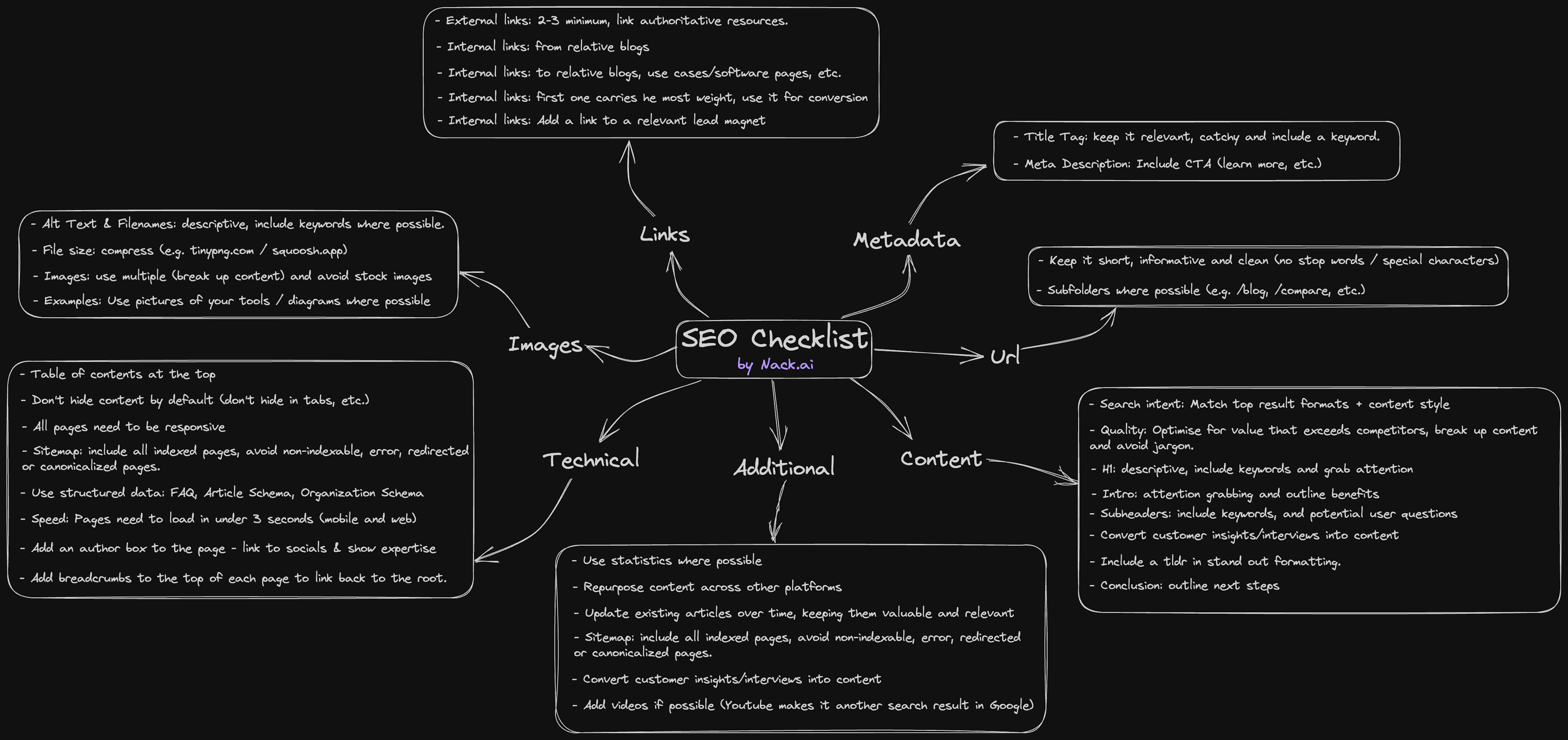If you're asking "how long does it take to learn SEO", rest assured, you're not alone. As bootstrapped founders at Nack, we get asked that question all the time. Learning search engine optimization (SEO) may seem daunting at first glance. With constantly evolving algorithms, new techniques and an overwhelming amount of misinformation online, it's easy to get discouraged. However, the fundamentals of SEO are surprisingly learnable for anyone willing to put in the effort.
In this comprehensive guide, we'll break down the key steps for learning SEO from scratch in 2023. You'll gain an understanding of how search engines like Google evaluate and rank pages. We'll walk through core optimization strategies from keyword research to technical SEO to inbound linking.
By the end, even total beginners will have a solid foundation for doing SEO in-house or working with an agency. Let's debunk the common myths around SEO:
Myth #1: SEO Requires Advanced Technical Skills
It's simply not true that you need to be a programmer or coding expert to understand SEO. While there are technical components like site architecture and speed, the most important ranking factors depend on your content. Focus first on creating high-quality, useful content optimized for target keywords.
Myth #2: SEO Changes All the Time
It's normal to feel overwhelmed by the rate of change. The truth is the SEO basics like keyword targeting, optimizing title tags and getting quality links remain relevant for years. Google has written a starter guide on SEO that is extremely helpful. Their core mission of providing the best search results has stayed the same, we just need to make it easier. Keep learning, but don't stress over every algorithm tweak.
Myth #3: You Can Learn SEO Overnight
Like any marketing skill, SEO takes dedicated time and effort to see results. But simple on-page optimization best practices can be implemented right away. Expect a gradual ramp up from initial strategic planning to long-term content promotion and link building. Consistency over time is key.
The takeaway? SEO is absolutely learnable with the right mindset. Let's start from the ground up by understanding how search engines actually work!
What is SEO?

Search engine optimization (SEO) is the process of improving a website's visibility in search engine results pages (SERPs). The goal is to have your website appear higher in the organic/unpaid search results for keywords and phrases relevant to your business.
Some key benefits of SEO include:
- Increased website traffic. Higher rankings lead to more people finding and visiting your site.
- Lower cost per click/lead/customer. SEO traffic has a lower cost than paid ads.
- Brand awareness & credibility. Appearing on the first page for your keywords signals authority and trust.
- Competitive advantage. Outranking other businesses for shared keywords gives you an edge.
- Higher conversion rates. Visitors from organic search convert better than other sources.
So how exactly does SEO work? While the algorithms powering Google and other search engines are complex, here are the main factors that influence rankings:
Relevant, High Quality Content
Creating content optimized around keywords your customers are searching for is key. The content should directly answer the user's query and be easy to digest.
Positive User Experience
Load speed, mobile friendliness, ease of navigation and other UX factors impact rankings. Google wants to surface sites that satisfy searchers.
Technical SEO
This involves optimizing your site's architecture, code, speed, security and other technical elements. Having the right technical foundations improves organic visibility.
Links/Popularity
Earning links from relevant high authority sites indicates trust and influence to search engines. But links must be earned naturally - manipulative tactics can penalize sites.
So at its core, SEO is about understanding searchers' intent and creating awesome content that satisfies users better than competitors. While search engine algorithms are complex, they reward websites that publish engaging, relevant content which leads to a positive experience.
With the right focus on content, UX and technical optimization, learning and applying SEO best practices can have a big impact on organic rankings and traffic to your website.
SEO Learning Roadmap for Beginners

Learning SEO can seem daunting at first, but following a step-by-step roadmap makes the process manageable for beginners. Here are the key skills to focus on and recommended strategies:
Keyword Research
- Learn how to use tools like Google Keyword Planner to identify high-value keywords that align with your business goals. Start with broader keywords before optimizing for more specific long-tail variants.
On-page Optimization
- Study the elements that matter most for on-page SEO - optimized title tags, meta descriptions, header tags, image alt text, etc. Use keywords naturally in your content.
Content Creation
- Produce useful, engaging, and keyword-optimized articles, videos, and other assets. Aim for long-form content over 2,000 words to satisfy search intent. Promote your best content.
Link Building
- Research link building techniques like guest posting, outreach, partnerships, etc. Focus first on earning editorially-given links vs. paid or low-quality links.
Technical SEO
- Learn the basics of site architecture, page speed, proper URL structuring, alt tags, navigation, and other technical elements.
Follow this roadmap for at least 3-6 months, analyzing your site's SEO performance each month and making adjustments. Use AI tools like Nack to analyze competitors and produce optimized content. With consistent effort and refinement, your site will climb in search over time. The keys are patience, high-quality content, and sticking to SEO best practices.
Keyword Research Basics

1. Use Keyword Research Tools
Input your initial keywords into Google Keyword Planner or a paid tool like Ahrefs to see their monthly search volume and get more keyword suggestions.
2. Analyze Keyword Competition
Use a tool like Ahrefs or SEMrush to analyze the top-ranking domains for your target keywords. Filter for keywords with low domain authority competition.
3. Refine Your Keyword List
Pick the keywords that have sufficient search volume, low competition and high relevancy to your brand. Expand the list with long-tail variations.
4. Categorize Keywords
Group related keywords into topics and categories you can create content around. Organize them into a spreadsheet.
5. Repeat and Expand
Revisit your keyword research regularly. Add in new keywords as you create content and evaluate search trends.
Conclusion:
- Keyword research is crucial for deciding what content to create and which terms to optimize for. Start the process early.
- Focus on low competition long-tail keywords early on for "quick wins
On-Page Optimization Fundamentals
On-page optimization refers to the practice of optimizing individual web pages to rank better in search engines. It focuses on factors that are directly under your control. Mastering on-page SEO is crucial for any effective SEO strategy.
Here are some of the key on-page factors to optimize:
Titles and Headings
- Use keyword-rich titles and headings (h1, h2, h3 tags) to indicate the topic of each page/section.
- Place important keywords close to the front of title tags.
- Make sure titles are descriptive, attractive, and enticing.
Content
- Include your target keywords naturally in the body content. Don't over-optimize.
- Create useful, original, high-quality content that answers searchers' questions.
- Include keywords in the opening and closing paragraphs of content.
- Break content down into scannable sections with descriptive headings.
- Optimize content for both search engines and human readers.
URL Structure
- Use keywords in URLs (e.g. example.com/keyword-based-url/)
- Keep URLs short, simple, and descriptive.
- Avoid excessive dynamic parameters.
Images & Media
- Use relevant images and media to enhance content.
- Optimize images with keyword-rich filenames and ALT tags.
- Add transcript/captions to videos.
Navigation & Linking
- Use descriptive text links instead of generic "click here\
Content Creation Strategies
When it comes to ranking highly in search results, content is king. Creating high-quality, useful content should be the core focus of any SEO strategy.
But what type of content works best for SEO? Here are some of the top formats to consider:
Blog Posts and Articles
In-depth, well-researched blog posts and articles are a great format for SEO. Aim for pillars that are over 2,000 words to really drive authority and rankings. Optimize each post for specific keywords, while providing value for readers.
Videos
Video is growing in importance for SEO. Create useful, engaging videos to rank in YouTube and drive traffic back to your site. Embed videos in posts and optimize titles, descriptions and transcripts.
Infographics and Visuals
Visual content can capture attention and convey information clearly. Infographics, charts, photos and illustrations can all enhance pages and posts. Make sure to optimize alt text and use visuals that align with your target keywords.
Tools and Resources
Offer value by creating tools, calculators, quizzes, worksheets and other resources related to your niche. These interactive formats help build links and bring more visitors.
Crafting SEO-Friendly Content

When writing any type of content, keep SEO top of mind. Here are some key tips:
- Conduct keyword research to build content around high-value SEO keywords and phrases. Analyze top-ranking content to find gaps and opportunities.
- Optimize titles and headers using target keywords. Include keywords naturally in headlines, image titles and section headers.
- Focus on quality over quantity. Well-written, comprehensive content ranks better than short, thin content. Write long-form content whenever possible.
- Use keywords throughout the content, including in the first and last paragraphs. Aim for a keyword density between 2-5%. Don't over-optimize.
- Include related keywords and LSI (latent semantic indexing) keywords, which are relevant phrases and secondary keywords. This helps search engines better understand the topic.
- Add internal links to point readers to other relevant content on your site. Link to resources, related posts and important pages.
- Format content for scannability. Break up text with subheads, bulleted lists and images. Use bold and italics for key phrases.
- Optimize with metadata. Craft compelling meta descriptions using keywords. Add alt text to images and videos.
Creating useful, engaging, keyword-optimized content takes time and effort. But in the end, it's the content itself that drives SEO success. By focusing on delivering value to readers, you also deliver value to search engines.
Link Building 101
Link building is a crucial component of any successful SEO strategy. It involves acquiring backlinks - links from other websites that point back to your own - in order to build authority and rankings in search engines.
While content creation and on-page optimization form the foundation of SEO, link building is what takes your efforts to the next level. Backlinks signal to Google that your content is valuable and worthy of surfacing for relevant searches.
However, link building has evolved quite a bit over the years. Simply acquiring as many backlinks as possible is no longer an effective approach. Quality and relevance now matter more than quantity.
Here are some effective beginner link building tactics to focus on:
Outreach and Guest Posting
One of the best ways to obtain quality backlinks is by guest posting on authority sites in your industry. Identify blogs that would be a good fit for your brand. Then, pitch relevant article ideas to them that provide unique value for their audience.
Make sure to include links back to your site within the article, but don't over-optimize. The focus should be on producing great content that earns links, not blatantly promoting your site.
Partnerships and Collaborations
Partner with other companies and influencers in your space. This could include co-creating content assets like guides, infographics, and videos.
You can then promote the content together on your respective sites and social channels. Include contextual backlinks where appropriate.
This is a great way to build relationships and get backlinks that Google values. The key is partnering with reputable sources that have an overlapping audience.
Broken Link Building
Find relevant articles and resources on other sites where the links are broken or outdated. Reach out to notify them and provide up-to-date content from your site as a replacement.
Most site owners appreciate this, which leads to earned links and referrals. Just use this selectively, and offer value rather than blatantly promoting your site.
Local Link Building
If you have a local business, link building on local directories, maps, and niche sites can move the needle. Make sure you have a Google My Business listing, and engage with customers online to earn local links.
Link Reclamation
Use online tools to find instances where your brand or product is mentioned online without a link back. Reach out respectfully to website owners asking them to hyperlink references to your business for added context and value for their readers.
Link Building Takes Time
Achieving SEO success requires consistency over an extended period. Be helpful, provide value, and build authentic relationships. This will gradually earn authoritative backlinks over time. Avoid anything too spammy or "black hat" if you want sustainable rankings.
Link building has a learning curve, but mastering a balanced and ethical approach will take your SEO skills to the next level. Focus on quality over quantity, and be patient. The results are well worth the effort.
SEO tools like Nack use artificial intelligence to help generate and evaluate top-performing content - unearthing link building opportunities. This simplifies and accelerates the link earning process for brands.
While SEO knowledge is required, leveraging technology like Nack makes link building more efficient. This allows you to scale your efforts and achieve faster rankings without compromising quality.
With a strategic, long-term approach, link building can tremendously boost your site's visibility and conversion rates. By implementing the tactics outlined here, you'll be well on your way to SEO success.
Tracking SEO Results
![]()
Once you have implemented your SEO strategies, the next crucial step is tracking your progress and results over time. Consistent monitoring allows you to determine what SEO tactics are working effectively, and which areas may need refinement. Here are some of the key ways to track your SEO efforts:
Search Engine Results Pages (SERPs)
- Regularly check keyword rankings in Google and other search engines to see if you are climbing up the first page for your target keywords. Use rank tracking software or manually search for your focus keywords.
- Analyze the entire SERP to see where your pages are ranking, and which sites you need to surpass. Monitor if you are gaining more featured snippets, knowledge panels etc.
Google Analytics
- Connect Google Analytics to see detailed metrics like impressions, clicks and traffic from organic search. Track goal conversions to see revenue/leads from SEO.
- Analyze traffic changes week-over-week and review top landing pages, keywords and traffic sources. This helps identify positive trends.
- Check behavior reports to see page depth, bounce rate, time on site for traffic from organic search. High bounce rates may indicate content issues.
Google Search Console
- Check Google Search Console for crawl errors, indexed pages, clicks and impressions. See which pages Googlebot can and cannot access.
- Review search analytics report to see queries, clicks and impressions. Identify new keyword opportunities.
- Submit XML sitemaps and request indexing of new pages. Monitor site coverage and indexation status.
Rank Tracking Software
- Use software like SEMrush, Ahrefs, Moz and others to track weekly keyword ranks.
- Check rankings for target keywords across Google and Bing.
- Monitor rankings in local packs and maps listings if optimizing locally.
Website Analytics
- Install analytics software like Google Tag Manager to track custom events like email signups, downloads, purchases etc. from organic traffic.
- Monitor site speed metrics like page load time, TTFB, page size etc. Slow sites can negatively impact rankings.
- Check internal site search to uncover popular queries and content gaps to target.
Competitor Benchmarking
- Regularly assess competitors’ rankings and SERP features for target terms.
- Analyze their content formats, topics, links etc. to identify areas of improvement.
- Check their website speed, security, technical optimization etc. for additional learning.
Qualitative Assessment
- Do regular user testing to see if the content satisfies searcher intent and encourages engagement.
- Assess conversions through surveys and polls to see if traffic quality has improved.
- Get feedback from real users to surface issues impacting performance.
Reporting Dashboards
- Create reports and dashboards in Google Data Studio, Klipfolio or other BI tools to monitor key SEO KPIs.
- Set up alerts and notifications for changes in key metrics like rankings, traffic etc.
- Share reports with stakeholders to demonstrate ROI and progress.
With consistent tracking using the above methods, you can determine patterns in your SEO results, pinpoint strengths to double down on, and isolate weaknesses to refine your efforts. Monitoring key metrics at regular intervals is crucial for continuously improving performance. Leverage tools like AI-powered Nack to automate analytics and get data-backed suggestions to boost your SEO results.
How do Search Engines Work?

Search engines like Google use complex algorithms and processes to crawl, index, and rank web pages. Here's a high-level overview of how it works:
Crawling
The crawling process is how Google finds new and updated content. The Googlebot crawls billions of web pages on the internet by following links and sitemaps. As it crawls, it stores copies of pages in the Google index.
Indexing
Indexing is how Google processes, analyzes, and stores information about web pages. The Googlebot extracts text, titles, keywords, links, and other data from crawled pages. This data gets organized into an enormous searchable index.
Ranking
When you search on Google, it analyzes your keywords against its index to find relevant results. Complex ranking algorithms then determine the order of results based on over 200 factors, including:
- Relevance - Does the content closely match what the user searched for? Pages with relevant titles, body text, metadata, and links will rank higher.
- Authority - Does the site/page have enough expertise and trust? Metrics like domain authority, page authority, and trust flow indicate authority.
- User Experience - Is the site fast, usable, and mobile-friendly? Positive user engagement signals like low bounce rates also boost rankings.
- Links - How many quality sites link to the page? Links from authoritative, relevant sites indicate a trustworthy page.
- Structured Data - Does the page use schema markup to highlight key data? Structured data enables rich search features like star ratings, events, and more.
The Google algorithm is constantly evolving to deliver the most relevant results to searchers. Some key factors it analyzes include:
- On-page Optimization - Title tags, headings, meta descriptions, image alt text, and body content all help Google understand the topic and usefulness of a page. Optimizing these gives pages a better chance of ranking.
- High-Quality Content - Unique, well-researched, and up-to-date content is one of the strongest ranking signals. Google rewards expertise and depth.
- Mobile-Friendliness - Over 60% of searches happen on mobile. Creating fast loading, responsive pages is critical for positive user experiences.
Anyone can learn SEO basics in a few weeks with free online resources. But mastering advanced SEO and staying on top of algorithm changes takes time. AI tools like Nack's can provide shortcuts so that you don't need to spend as much time learning SEO in detail, by taking care of most of the hard work for you -
Can I do SEO by myself?

To be clear, asking "how long does it take to learn seo?" is a different question from "can I do SEO by myself?". Learning SEO's concepts is very different to doing it. I'm not trying to deter, you! However, doing SEO completely by yourself as a beginner can be challenging. That said, it is certainly possible to get started and make good progress on your own.
Here are some key considerations:
SEO requires learning multiple skills
At its core, SEO relies on creating high quality content, conducting keyword research, optimizing pages for search engines, building links, and analyzing results. Each of those areas have nuances to learn. There's elements of coding, research, writing, etc. It's a broad skill set.
While you can focus on each area one step at a time, it takes time to develop proficiency in all of them. Remember, there are entire departments and roles dedicated to small segments of SEO - so expect a learning curve.
Leverage tools that help to improve SEO
Fortunately, there are now excellent SEO tools available to assist with key tasks and provide guidance. This makes learning the basics of SEO much easier. For example, Nack's AI powered SEO tool can analyze competitors, suggest content ideas, and help generate amazing SEO friendly blog content. Other tools like Ahrefs, Moz, and SEMrush also have robust offerings.
Lean on technology to accelerate your learning and automate tedious SEO tasks. The right tools make DIY SEO much more achievable.
Consider hiring a consultant
Considering whether or not to hire an SEO consultant is a big decision. Working with an experienced SEO consultant, even if just for an initial strategy call, can help you avoid beginner mistakes. A consultant can review your approach and site, and provide tailored recommendations based on years of experience.
The investment is usually well worth it for the time savings and benefits of their expertise. A consultant can help you prioritize the most impactful SEO opportunities.
Learning SEO requires focusing your efforts
It's easy to get overwhelmed by the breadth of SEO. Instead of trying to master it all at once, focus your energy on high return activities:
- Creating awesome content - Unique, high quality content that targets buyer keywords will get you the furthest. Resist shortcuts that prioritize speed over substance.
- Technical site optimizations - Ensuring your site has a solid technical foundation with fast page speeds, responsiveness, structured data, etc. establishes a strong base for SEO success.
- Keyword research - Identifying low competition keywords that attract qualified traffic for your business is incredibly valuable. Keyword research tools can help uncover these hidden gems.
Mastering even just those three areas will position you for significant organic search improvements. You can layer on link building, local SEO, conversions, and more over time.
Develop an organized process
With so many moving pieces, having a systematized approach to your SEO efforts is crucial when going at it alone. Stay organized:
- Maintain an editorial calendar for content creation.
- Use spreadsheets to track keywords, pages, and ranking progress.
- Keep a running list of SEO project ideas and prioritize them.
- Schedule time for keyword research, content creation, link prospecting, etc on your calendar.
As we mentioned, certain tools like Nack AI may take care of some of these things for you, and naturally embed consistent processes into your workflow. The more structured your process, the less overwhelmed you'll feel. Celebrate small wins often to stay motivated.
SEO takes time
It's important to have realistic expectations when it comes to DIY SEO. You won't see dramatic results overnight. But you can make steady progress month to month by sticking with it.
SEO is a marathon, not a sprint. Building authority and rankings takes persistence. But over time, your traffic and leads will compound as your site climbs higher in the search results.
The reward is worth the effort
At the end of the day, taking the time to learn SEO and improve your website's visibility can transform your business. The incremental website traffic, leads, and sales make all those late nights researching keywords and writing content well worth it.
While outsourcing parts of SEO is smart, nothing beats getting in the trenches yourself. You'll gain knowledge that improves your overall marketing capabilities and unlocks future opportunities.
So while doing SEO completely solo has challenges, with commitment and the right approach, you can absolutely do it successfully and reap the rewards it brings.
Useful Tools

SEO can seem overwhelming at first, with so many moving parts to keep track of. However, having the right tools by your side can simplify the process and set you up for SEO success. Here are some of the most useful tools for both beginner and advanced SEO practitioners:
Nack
Nack offers an all-in-one SEO platform powered by artificial intelligence. It allows you to research keywords, analyze competitors, generate optimized content, track rankings, and more. Nack's AI takes care of time-consuming SEO tasks like keyword research and content creation, freeing you up to focus on strategy.
Key features include:
- AI-generated content optimized for keywords and search intent
- Competitor analysis to reveal SEO weaknesses to target
- Automated keyword tracking and ranking reports
- Integration with Google Search Console for actionable insights
Nack is the perfect tool for beginners looking to learn SEO basics in a simplified way, as well as experienced SEO experts who want to scale campaigns efficiently.
SEMrush
SEMrush is one of the leading SEO and digital marketing tools, used by over 500,000 professionals worldwide. It provides comprehensive data on keywords, rankings, backlinks, traffic, and more to inform your SEO strategy.
Key features include:
- Accurate keyword difficulty scores and search volume data
- Detailed competitor analysis and monitoring options
- Backlink analysis to improve link building
- Marketing toolkit for PPC, content, social and more
SEMrush offers different plans based on needs, making it accessible for businesses of all sizes. The detailed data it provides is extremely valuable for identifying SEO opportunities.
Moz
Moz is another top SEO tool that excels at keyword research, backlink analysis, and page optimization recommendations. It offers both beginner-friendly and advanced features.
Key features:
- Keyword difficulty and search volume data
- Page optimization grades and actionable tips
- Backlink analysis including quality and relevance
- Site crawl capability for technical SEO
- Suite of learning resources and communities
Moz makes it easy to analyze key elements of SEO and improve website authority. Their Keyword Explorer is praised for its accuracy. They also offer useful learning content for all skill levels.
Ahrefs
Ahrefs focuses on backlink analysis and keyword research. It aims to help users boost their search traffic through better link building and content optimization.
Key features:
- Discover link building opportunities through competitor backlink analysis
- Track keyword rankings and monitor SEO progress over time
- Identify top-performing content to inform content strategy
- Site audit for technical SEO issues impacting performance
- Ranking forecasts based on historical algorithm data
Ahrefs provides robust data to optimize content and outreach strategies. It's a must-have tool for understanding the link building landscapes and benchmarking against competitors.
The wealth of data these tools provide can seem overwhelming at first. Focus on learning one tool at a time, and utilizing the specific features that will inform your target SEO goals. For example, Moz and Ahrefs are great for keyword and competitor research. SEMrush provides holistic tracking and reporting. AI-powered tools like Nack make easy work of content creation and optimization.
The right tools won't do the hard work for you - but they will supply the insights and automation to help efficiency. Approach them as partners along your SEO journey.
The Rise of AI

The field of artificial intelligence (AI) has made tremendous strides in recent years. Generative AI, in particular, is revolutionizing various industries - including SEO and content creation.
With the emergence of advanced natural language processing models like GPT-4 and Claude-2, it's now possible for AI tools to generate high-quality, human-like content tailored for specific keywords and topics. When asking "how long does it take to learn SEO", AI cannot be ignored. This has major implications for SEO professionals and content creators.
One innovative company at the forefront of leveraging AI for SEO is Nack. Their AI-powered SEO tool analyzes top-ranking content for target keywords, gaining key insights to craft optimized content. It's an ingenious use of AI to streamline and enhance the content creation process.
Some of the benefits Nack provides include:
- Empowering smaller teams - Generating optimized content at scale is extremely difficult without an army of writers. Nack lets small teams leverage leading-edge AI to punch above their weight class content-wise.
- Enabling focus on overlooked keywords - Certain long-tail, low competition keywords may have been previously deprioritized due to resource constraints. With Nack, no keyword opportunity gets left on the table.
- Mitigating content quality concerns - While AI holds great promise, some AI content lacks the nuance and quality needed to rank well. Nack combines best-in-class models with rigorous engineering to produce content exceeding human quality.
As AI progresses, ethical concerns around content quality and proliferation will grow. But with responsible stewardship, AI can elevate SEO to new heights. The rise of AI is enriching SEO professionals with insights and efficiencies like never before. With Nack's innovative application of AI, smaller teams can seize opportunities once reserved for major enterprises. The SEO landscape is shifting, and the upward trajectory of AI hints at even bigger changes on the horizon. But one thing is clear - advanced AI is already transforming SEO for the better.
Conclusion
Learning search engine optimization may seem daunting at first, but with the right guidance and tools, it can be an accessible skill for even complete beginners. Here are some key takeaways:
- The basics of SEO - like keyword research, on-page optimization, and content creation - can be learned in a few weeks or months. Mastery takes longer through continual practice.
- While some technical knowledge helps, you absolutely don't need to be an expert coder or marketer to do well at SEO. Many of the fundamentals relate to optimizing content for search engines and people.
- High-quality, useful content always wins.
